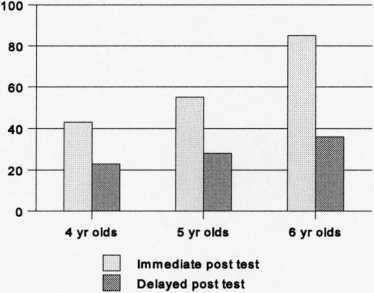To what extent does children ,sperformance on the naming task differ by age ?
If all children from each age group (64 participants) were correct on the two target words,
the maximum total score would be 128 for each age group in each post test. Figure 5.2 below
demonstrates children’s performance on the naming task by age group in the immediate and
delayed post test.
Figure 5.2 Total number of correct responses on the naming task by age for both tests

Significant correlations were found between children’s age and their performance on the
naming task during the immediate post test. The correlations were still significant during the
Immediate post test, when children’s vocabulary knowledge and memory were controlled for
(see Table in Appendix 5.8 for correlations).
Children’s responses were also analysed using two one way ANOVAs with age as the only
factor and scores on the naming task as the dependent measure during the immediate and
delayed post test. Significant differences were found during the immediate (Kruskal-WaIlis
I-Way Anova: X2= 24.3, df=2, p<.0000) but not the delayed post test. Post hoc analysis of
the immediate post test revealed that the 6 year olds performed significantly better than the
4 year olds (Mann-Whitney: Z=4.8, p>.0000) and the 5 year olds (Mann-Whitney: Z=3.3,
p<.005).
Furthermore, the same pattern was evident within each linguistic condition. Significant
differences by age were found for the Inference group during the immediate (Kruskal-Wallis
I-Way Anova: X2= 8.7, df=2, p<.05) and the delayed post test (Kruskal-Wallis I-Way
Anova: X2= 7.6, df=2, p<.05). Post hoc analysis revealed that the 6 year olds performed
significantly better than the 4 year olds for both post tests (Imme: Mann-Whitney: Z=2.9,
114
More intriguing information
1. Licensing Schemes in Endogenous Entry2. Improvement of Access to Data Sets from the Official Statistics
3. The name is absent
4. Existentialism: a Philosophy of Hope or Despair?
5. The name is absent
6. Fiscal federalism and Fiscal Autonomy: Lessons for the UK from other Industrialised Countries
7. Two-Part Tax Controls for Forest Density and Rotation Time
8. Disturbing the fiscal theory of the price level: Can it fit the eu-15?
9. The name is absent
10. Feeling Good about Giving: The Benefits (and Costs) of Self-Interested Charitable Behavior